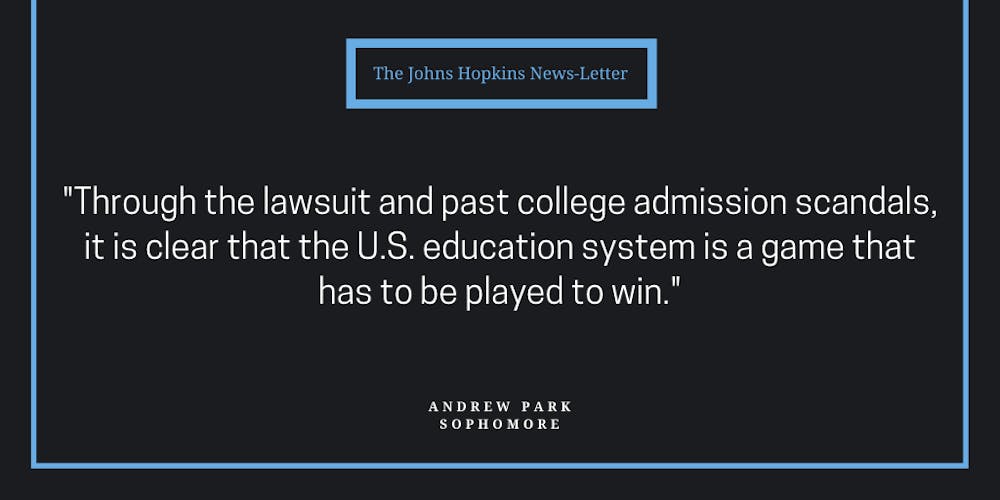Last month, Hopkins was added to the list of private universities accused of colluding to reduce financial aid in an amended complaint.
The original lawsuit was filed on Jan. 9 against 16 members of the 568 Presidents Group, an organization of colleges collaborating to follow a set of common standards, called the Consensus Methodology, for determining the family’s ability to pay for college. The plaintiffs claim that this collaboration is done in an effort to reduce the amount of financial aid awarded to families in need.
This organization is named after Section 568 of Improving America’s Schools Act of 1994, which allows such collaboration so long as all the colleges are need blind, meaning that they assess applicants for admission regardless of their ability to pay.
The Jan. 9 lawsuit alleged that Columbia University, Dartmouth College, Duke University, Georgetown University, the Massachusetts Institute of Technology, Northwestern University, the University of Notre Dame, the University of Pennsylvania and Vanderbilt University have made admissions decisions with regard to the students and their families need of financial assistance, while Brown University, the California Institute of Technology, the University of Chicago, Cornell University, Emory University, Rice University and Yale University were named as members of the 568 Presidents group.
In the amended complaint, those seven colleges were included in the allegations. The complaint also added Hopkins as a defendant.
“Johns Hopkins joined the 568 Cartel in 2021, has taken overt steps in furtherance of the conspiracy alleged herein (including meeting with Defendants and discussing the Consensus Methodology with them) and first implemented the Consensus Methodology with respect to Early Decision applicants in or around November 2021,” the amended complaint reads.
In an interview with The News-Letter, Robert D. Gilbert, managing partner of Gilbert Litigators and Counselors, which represents the plaintiffs, emphasized that Hopkins chose to join the 568 Presidents Group last year and is therefore liable.
In an email to The News-Letter, Vice President for Communications Andrew Green stated that the University has not only operated fully within the law but also expanded financial aid and admissions practices to high-achieving students from all socioeconomic backgrounds.
“Hopkins ranks among the top-ten Universities in per-student financial aid support and has transformed the socioeconomic makeup of its undergraduate classes while raising academic standards,” he wrote. “We are proud of our commitment to need-blind admission and intend to vigorously defend this lawsuit.”
Green added that the lawsuit will not influence the University’s future financial aid.
In an interview with The News-Letter, Lawrence White, a professor of economics at the New York University Leonard N. Stern School of Business and previous director of the economic policy office in the antitrust division of the U.S. Department of Justice, maintained that the alleged collusion of price fixing is a crime that increases price for students in need of financial aid.
“I would love to see this whole collusive effort to end. I don't even like the provision of the law that allows it to happen even if these universities are completely need blind,” he said.
White also spoke of the possible outcomes of the lawsuit if the plaintiffs succeed.
“If the plaintiffs are correct, universities are not competing as vigorously as they otherwise might to attract students of various kinds, and that would include low-income students. So, either they're going to compete for more [variety of students] which would mean larger stipends for low-income students, or there's going to be a more rigorous need-blind process,” he said. “Either way, if the plaintiffs succeed, students from low-income households will benefit.”
He further predicted that if the plaintiffs win, the universities will choose to stop communicating about the Consensus Methodology rather than implement a more rigorous need-blind process while maintaining the collaboration.
In an email to The News-Letter, sophomore Andrew Park explained that the allegations of the financial aid lawsuit highlight a critical problem of the American university system.
“Elite institutions have shown their recruiting priorities aren't necessarily based on merit but instead weighed on how [recruitment] affects their bottom line,“ he wrote. “Through the lawsuit and past college admission scandals, it is clear that the U.S. education system is a game that has to be played to win.”
Park also shared his thoughts on the involvement of Hopkins in the lawsuit.
“I would love to think my institution is different than other elite institutions. While I understand that running a private university is business, the lawsuit makes me aware that students, faculty and affiliates are all a part of the financial statements and must be balanced to keep the machine running,“ he said. “It can feel cold, to say the least.”
Park added that when he was applying to colleges in 2020, he received strong financial aid to attend, whereas his friend was did not and attended a different school. He found it unfortunate that he and his friend qualified academically but were not both awarded the aid they needed.





